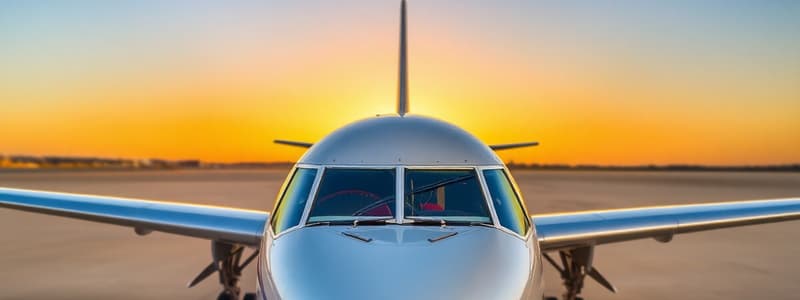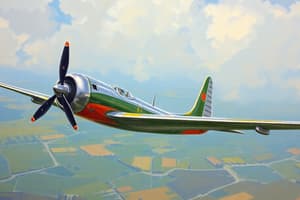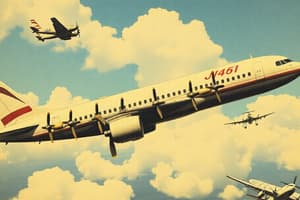Podcast
Questions and Answers
Which classification of aircraft is primarily designed to carry passengers but is limited to a maximum of 19 seats?
Which classification of aircraft is primarily designed to carry passengers but is limited to a maximum of 19 seats?
- Utility
- Commuter (correct)
- Transport
- Experimental
What is the main function of the fuselage in an airplane?
What is the main function of the fuselage in an airplane?
- To contain the fuel tanks
- To support the wings
- To house the cabin and controls (correct)
- To provide lift
Which type of aircraft is classified as 'experimental'?
Which type of aircraft is classified as 'experimental'?
- Transport aircraft
- Limited military aircraft
- Amateur home-built planes (correct)
- Commercial airliners
Which aircraft classification is used for special purposes like water bombing?
Which aircraft classification is used for special purposes like water bombing?
What construction type uses a skin to support almost all loads imposed on an aircraft?
What construction type uses a skin to support almost all loads imposed on an aircraft?
What is the primary function of the fuselage in an aircraft?
What is the primary function of the fuselage in an aircraft?
Which of the following categories of aircraft is designed to withstand heavier stresses than normal aircraft?
Which of the following categories of aircraft is designed to withstand heavier stresses than normal aircraft?
Identify which type of aircraft is classified as having a fixed wing and is heavier than air.
Identify which type of aircraft is classified as having a fixed wing and is heavier than air.
What type of aircraft is a hot air balloon classified as?
What type of aircraft is a hot air balloon classified as?
Which category of aircraft certification allows for limited purposes in civilian aviation?
Which category of aircraft certification allows for limited purposes in civilian aviation?
Which classification of airplane typically includes trainer aircraft?
Which classification of airplane typically includes trainer aircraft?
What is the major difference between single engine and multi-engine aircraft?
What is the major difference between single engine and multi-engine aircraft?
Identify the airplane construction type that primarily uses skin to support loads.
Identify the airplane construction type that primarily uses skin to support loads.
What is the primary function of the alternator in a typical modern light airplane?
What is the primary function of the alternator in a typical modern light airplane?
Which component is used to measure the oil supplied to the engine in P.S.I.?
Which component is used to measure the oil supplied to the engine in P.S.I.?
In a wet sump system, where is the oil contained?
In a wet sump system, where is the oil contained?
What is the role of the cowl flaps in the cooling system of an aircraft engine?
What is the role of the cowl flaps in the cooling system of an aircraft engine?
What is the consequence of exhaust gas leakage into the aircraft cabin?
What is the consequence of exhaust gas leakage into the aircraft cabin?
What does the bus bar in an aircraft's electrical system primarily do?
What does the bus bar in an aircraft's electrical system primarily do?
Which type of propeller is characterized by blades that have a fixed angle?
Which type of propeller is characterized by blades that have a fixed angle?
What is the primary purpose of the master switch in an airplane's electrical system?
What is the primary purpose of the master switch in an airplane's electrical system?
What can cause pre-ignition in an engine?
What can cause pre-ignition in an engine?
What is the primary role of the fuel selector valve in an aircraft?
What is the primary role of the fuel selector valve in an aircraft?
Which method can be implemented to decrease engine temperature?
Which method can be implemented to decrease engine temperature?
What is a major hazard associated with refueling an aircraft?
What is a major hazard associated with refueling an aircraft?
Which type of fuel system relies on gravity for fuel flow?
Which type of fuel system relies on gravity for fuel flow?
What is the purpose of enriching the fuel mixture in an aircraft's engine?
What is the purpose of enriching the fuel mixture in an aircraft's engine?
Why is it important to fill tanks after the last flight of the day?
Why is it important to fill tanks after the last flight of the day?
What is the function of engine oil in an aircraft engine?
What is the function of engine oil in an aircraft engine?
Which arrangement corresponds to an opposed type reciprocating engine?
Which arrangement corresponds to an opposed type reciprocating engine?
During which phase of the 4-stroke operating cycle does the fuel-air mixture get ignited?
During which phase of the 4-stroke operating cycle does the fuel-air mixture get ignited?
What happens to the RPM when carb heat is applied and ice melts due to the application?
What happens to the RPM when carb heat is applied and ice melts due to the application?
Which component of the ignition system is responsible for providing the spark?
Which component of the ignition system is responsible for providing the spark?
What type of abnormal combustion is characterized by uncontrolled explosive ignition of the fuel/air mixture?
What type of abnormal combustion is characterized by uncontrolled explosive ignition of the fuel/air mixture?
What is the main purpose of the induction system in an aircraft engine?
What is the main purpose of the induction system in an aircraft engine?
Which of the following is NOT a part of a reciprocating engine?
Which of the following is NOT a part of a reciprocating engine?
What symptom indicates a potential detonation issue in an aircraft engine?
What symptom indicates a potential detonation issue in an aircraft engine?
Flashcards are hidden until you start studying
Study Notes
Aircraft Definitions
- Aircraft is defined as any weight-carrying device designed to be supported by the air.
- Airplane is an engine-driven, fixed wing, heavier-than-air aircraft that generates lift through airflow over its wings.
Airplane Categories
- Airplane Categories are based on the number of engines and the landing gear.
- Single-engine, land: Cessna 152, etc.
- Multi-engine, land:
- Single-engine, sea:
- Multi-engine, sea:
Aircraft Categories by Intended Use
- Normal: Common for smaller aircraft, including training aircraft.
- Utility: Similar to Normal category, but can handle heavier loads.
- Acrobatic: Minimal operational limitations, designed for maneuvers.
- Commuter: Carries passengers, limited to 19 seats and 19,000 lbs.
- Transport: Used by airlines.
- Restricted: Specific purposes such as spraying, water bombing.
- Limited: Military aircraft with limited civilian usage.
- Provisional: Newly designed aircraft awaiting full certification.
- Experimental: Home-built, racing, or research and development aircraft.
Major Airplane Components
- Fuselage: Houses the cabin, cockpit, seats, controls, and cargo. It acts as a core structure, provides room for components, and supports other components.
- Fuselage Construction Types:
- Truss: Uses visible struts and wire bracing for support.
- Monocoque: Relies on the skin for structural integrity, minimizing weight.
Reciprocating Engines
- Reciprocating engines are categorized as opposed, radial, V-type, and inline based on the arrangement of their cylinders
- The piston engine power cycle has four stages: intake, compression, power, and exhaust.
- The four stages are a continuous process that creates energy
Induction System
- The induction system mixes air and fuel in the correct proportion
- Carburetor icing is a potential hazard and can be identified by a drop in engine RPM when carb heat is applied, followed by a slow increase as the ice melts.
- Turning carb heat off allows the engine RPM to increase further
- An intake port allows air to enter the engine and is equipped with an air filter to prevent dust and debris from entering the engine
- For optimal performance, superchargers/turbochargers help to improve air density at higher altitudes
Ignition System
- The ignition system initiates the combustion process by generating a spark
- Magnetos are a key component in the ignition system as they self-generate power for the spark plugs, eliminating the need for a battery
- Spark plugs are responsible for generating the spark to ignite the fuel-air mixture
- Connecting wires link the ignition switch, magnetos, and the spark plugs
- The ignition switch controls the magnetos
- A dual ignition system enhances engine performance and provides redundancy for increased safety
Abnormal Combustion
- Detonation is an uncontrolled explosion of the fuel-air mixture within the combustion chamber, often causing excessive temperature and pressure
- Detonation can lead to engine damage and is caused by various factors, including low-grade fuel, lean fuel-air mixture, high temperature, and sudden throttle openings at low speeds
- Pre-ignition is a premature ignition of the fuel-air mixture before the spark, often a result of detonation or hotspots in the cylinder caused by carbon deposits
Fuel System
- The fuel system is responsible for storing and delivering fuel at the right pressure and quantity
- Gravity-fed systems utilize gravity to move fuel from the tanks to the engine
- Fuel pump systems are common in low-wing aircraft due to the fuel tanks being located below the engine, and use a pump for fuel flow
- Primers manually pump fuel into the intake system prior to starting, particularly helpful in cold weather
- Fuel tanks are typically located in the wings and have vents for pressure equalization and overflow drains to prevent tank rupture due to fuel expansion
- Fuel quantity gauges display the amount of fuel in the tanks
- Fuel selector valves allow pilots to select fuel from different tanks
- Vapor Lock can occur when air enters the fuel system
- Refueling requires safety precautions, including grounding the aircraft to prevent static electricity build-up, the potential for sparks and fire.
- Higher grade fuel should be used if regular avgas is unavailable
- Fuel should always be checked for water and contaminants.
- Filling tanks after flights helps prevent moisture buildup from condensation
Lubrication System
- The lubrication system ensures proper lubrication, cooling, sealing, and cleaning of the engine's moving parts.
- Dry sump systems store oil in a separate tank and utilize pumps for circulation
- Wet sump systems store oil within an integral part of the engine
- A dipstick is used to measure oil levels
- An oil pressure gauge shows the oil pressure in PSI
- An oil temperature gauge monitors the oil temperature
Cooling System
- The cooling system ensures that the engine operates within the manufacturer's temperature parameters
- Air is drawn in through an inlet near the propeller hub and directed towards the hottest parts of the engine, primarily the cylinders
- Cowl flaps regulate the temperature within the engine compartment and are adjusted by the pilot based on cylinder head temperature readings
Electrical System
- Modern light aircraft typically use a direct current (DC) electrical system
- An alternator generates electrical power when the engine is running
- A battery provides emergency electrical power and power during engine start
- A bus bar serves as a main conductor and distribution point for the electrical system
- An ammeter/load meter measures the electrical current (amps) flowing in or out of the battery
- The master switch controls the aircraft's electrical system, except the ignition system which receives power directly from the magneto
- Fuses and circuit breakers protect electrical circuits from overload
Exhaust System
- The exhaust system carries burnt gases from the engine cylinders into the atmosphere
- Carbon monoxide is a component of exhaust gas, leakage into the cabin must be prevented
- The exhaust system also provides heat for the cabin and carburetor
Propellers
- Propellers are rotating airfoils that generate thrust
- Fixed-pitch propellers have blades with a fixed angle
- Climb propellers have low blade angles optimal for takeoff and climb
Studying That Suits You
Use AI to generate personalized quizzes and flashcards to suit your learning preferences.



